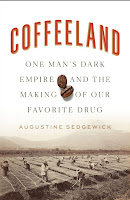Generations of violence in El Salvador
CoffeeLand describes the industrialization of coffee farming brought about by James Hill and the exploitation of the campesinos who worked the coffee plantations. Sedgwick also places the history of Salvadoran coffee within the broader history of coffee as a commercial product. It is a story of an industrializing global economy where coffee came to be seen as a drink which could induce even greater productivity from the work force.
A good section of CoffeeLand deals with the origins and execution of "La Matanza" -- the 1932 massacre of 10,000-20,000 mainly indigenous campesinos by the Salvadoran military government led by General Maximiliano Martinez. The massacre put down a revolt of campesinos in the coffee rich areas of the west and was funded and supported by Hill and the other coffee barons of El Salvador who needed to quash seeds of discontent among their exploited work force. It was coffee money which would buy the machine guns which were such efficient tools for a massacre.
That massacre plays a central role in Unforgetting, a Memoir of Family, Migration, Gangs and the Revolution in the Americas, the memoir of Roberto Lovato. In telling the story of his family, Lovato reveals the inter-generational trauma of violence afflicting Salvadoran families both in El Salvador and after emigration to the US. It's a legacy of violence with a straight line from La Matanza, through El Salvador's civil war and through the formation of Mara Salvatrucha and Barrio 18 gangs in southern California among the refugee children of the war.
Now I realized that learning both Salvadoran history and the history of my family was essential to understanding my story. Our future depends on remembering that we are a fierce, resilient people forced in a crucible of poverty and staggering violence.
The Hollywood Kid: The Violent Life and Violent Death of an MS-13 Hitman is written by journalist Oscar Martinez and sociologist Juan Jose Martinez, two brothers who have a long history of investigation into the gangs of El Salvador. The Hollywood Kid is Miguel Ángel Tobar, an MS-13 assassin who participated in more than 50 murders before becoming a traitor to the gang and a state's witness against MS-13 leaders and his fellow gang members. The Martinez brothers interviewed the Kid over a span of years in the shack where he was under protective custody pending court proceedings where he would testify against his fellow MS-13 gang members.
Through the story of the Hollywood Kid, the Martinez brothers provide an in depth look at the history of MS-13 or Mara Salvatrucha, from its origins among Salvadoran youth gathering to listen to heavy rock in the Los Angeles area to the become the gang which would be Donald Trump's favorite image for demonizing migrants crossing the southern border of the US.
The Hollywood Kid does not glamorize or sentimentalize the story of the Kid. Instead we see the story of a boy growing up in poverty and a broken family, who becomes consumed by "The Beast." The Beast is the label the Kid gives to the force which drives him and the other mareros to be savage killers, but it is also the force which will pursue and ultimately claim him. One does not betray MS-13 or the Beast and live to an old age in El Salvador.
A central setting for each of these books is western El Salvador. It is the place of the Hill family coffee holdings and the site where blood flowed in La Matanza. It is the birthplace of Roberto Lovato's Pop and the birthplace and killing grounds of the Hollywood Kid.
The other central location is California. James Hill would find buyers for the output of his coffee plantations in San Francisco and send his children to school there. Roberto Lovato was born and lives in California. The Martinez brothers describe the origins of MS-13 on the streets of southern California populated by refugee of the Salvadoran civil war.
These are three books for those who want to understand that the history of generations of violence in El Salvador can never be reduced simply to photos of tattoo-covered bodies of captured gang members.



Comments
GregV